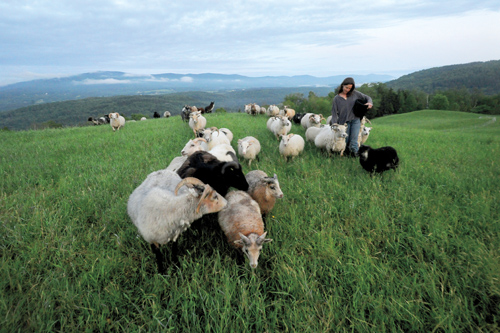By Sue Dickman ’89
Deep in the Green Mountains, one alumna shares her life with 90 Icelandic sheep. Fortunately, they’ll eat anything
[Farming] As a child Helen Whybrow ’90 longed for a cow. Growing up in Plainfield, N.H., she was surrounded by farmers. So she and her sister asked their doctor parents for cows. “They laughed at us for the first two conversations,” Whybrow recalls, “but by the 10th conversation, they sort of gave in.” Whybrow’s parents told their daughters they could get any animals they wanted as long as the parents never had to go to the barn. And so the sisters got their cows, eventually tending a herd of 10. Throughout their teenage years, they sold milk and butter and kept up with the daily barn chores. Given this history, it is unsurprising that Whybrow (right) now shares her life not just with her husband, Peter Forbes, and daughters Willow and Wren, but also with 90 purebred Icelandic sheep that graze in the pastures of Knoll Farm, deep in the Green Mountains of Vermont. Whybrow and Forbes are also the founders of a leadership development organization, the Center for Whole Communities, based at the farm.
Given this history, it is unsurprising that Whybrow (right) now shares her life not just with her husband, Peter Forbes, and daughters Willow and Wren, but also with 90 purebred Icelandic sheep that graze in the pastures of Knoll Farm, deep in the Green Mountains of Vermont. Whybrow and Forbes are also the founders of a leadership development organization, the Center for Whole Communities, based at the farm.
Whybrow’s path from teenage dairy farmer to breeder of sheep has not been entirely straightforward. She worked in book publishing for many years and also edited Dead Reckoning: Tales of the Great Explorers 1800–1900, first published in 2003 by W.W. Norton. But her interest in farming never waned, and in 2001, Whybrow and Forbes learned about Knoll Farm, which had been donated to the Vermont Land Trust by its longtime owner. The VLT was looking for new owners who would not only farm but also run educational programs there.
Though Knoll Farm had a long agricultural history, it hadn’t been actively farmed since the 1930s. The land got a tremendous amount of sun but was too steep and rocky for row crops or vegetables. Thus the arrival of Icelandic sheep, which will eat anything, including weeds and brambles. The sheep, through their grazing, allow the farmers to reclaim worn-out pastures. Whybrow and Forbes now sell breeding stock, lamb, wool and fleeces. They also grow eight varieties of organic blueberries.
The Center for Whole Communities, also founded in 2001, brings together leaders from the environmental and social justice movements to discuss issues of politics, race, class and privilege in American society, with the hope of learning to solve problems more collaboratively. Whybrow describes the center as “creating the container” that allows such difficult conversations to occur. More than 1,500 people have participated in the center’s programs, all on fellowship. Having “no barrier to entry” was crucial for Whybrow and Forbes, and they believe the no-fee model is part of the center’s success.
In recent years Whybrow and Forbes have stepped back from active leadership of the center, whose work now continues across the country. This has allowed Whybrow to spend more time on the farm, which she sees “as a place to model what we believe in, in terms of land stewardship and land restoration.” One of her recent projects is a short film, Organic Matters, which features Vermont farmers talking about the importance of organic food and agriculture to the health of people and the environment.
During the deep winter months, Whybrow returns to a quieter writing life. She and Forbes are collaborating on a biography of their mentor and friend Bill Coperthwaite, the homesteader and yurt builder who died last year, which will be published by Chelsea Green in the fall. In mid-winter, Whybrow was working hard to finish the draft before her favorite time of year, lambing season in April, when her capable hands would be otherwise occupied by many small Icelandic sheep and their mothers.
Sue Dickman ’89 is a writer whose essays have appeared in such publications as the Washington Post and San Francisco Chronicle.
Photo by Peter Forbes